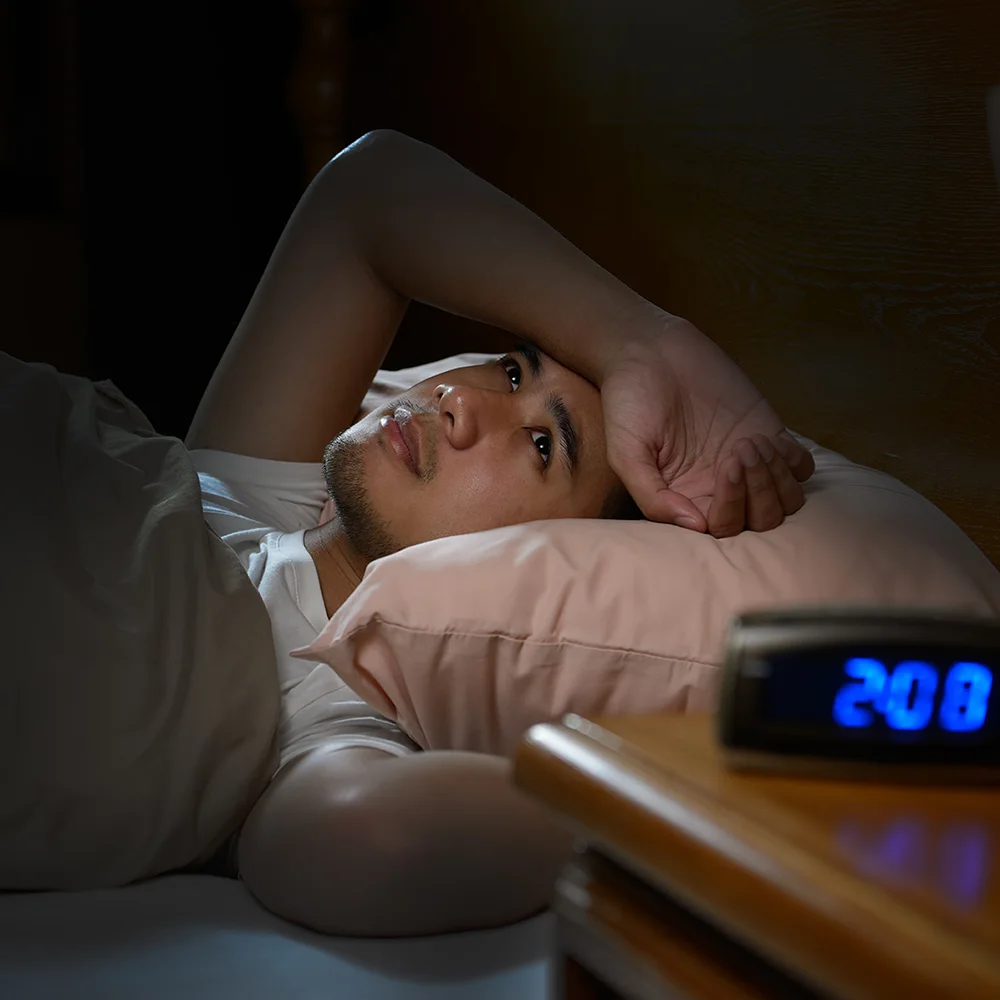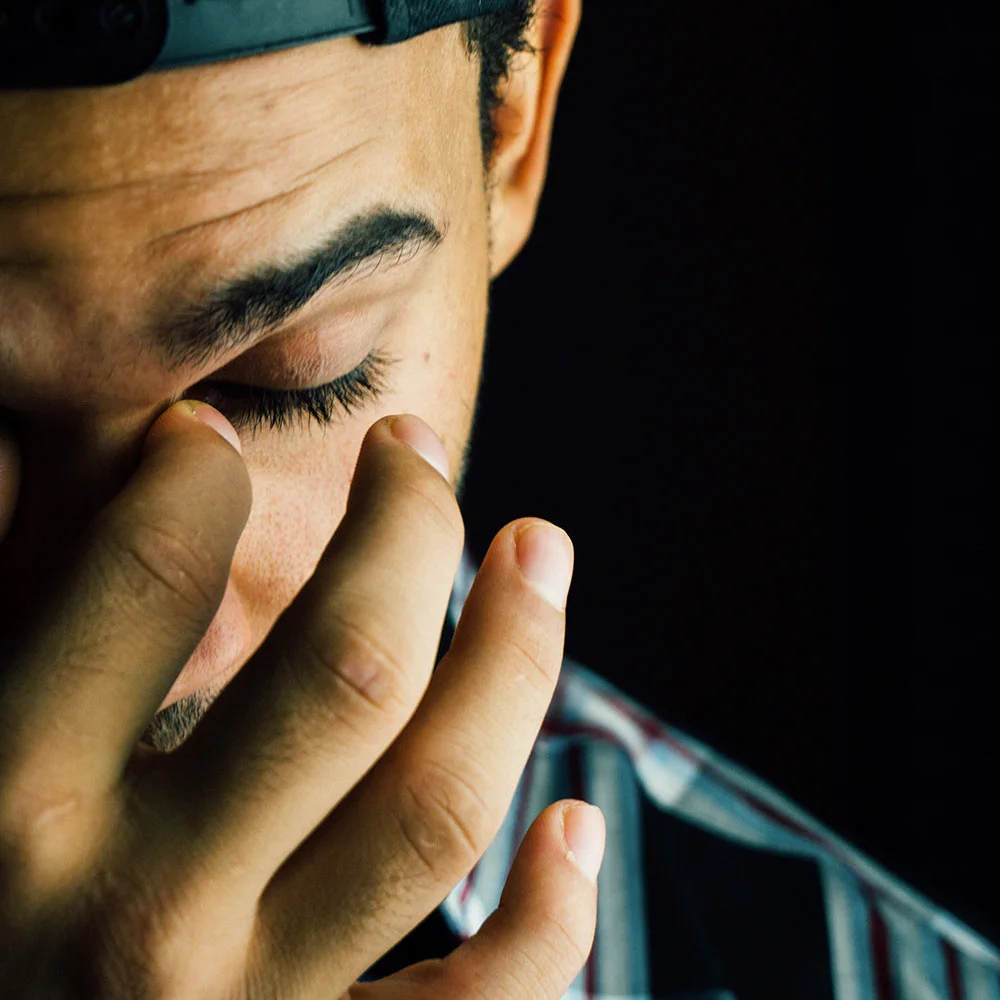Here's what we'll cover
Here's what we'll cover
If you’re looking for natural remedies for anxiety, an internet search on the topic yields thousands of possible results. It can be overwhelming to sort through pages of conflicting information to find out what—if anything—might actually be helpful.
Some research suggests the use of melatonin for anxiety (Madsen, 2015). Best known as a natural sleep aid, melatonin is generally safe and may be worth a try. Read on to learn more about melatonin and its effectiveness for anxiety.
What is melatonin?
Melatonin is a hormone that comes from the pineal gland of your brain. Its main job in your body is to regulate your internal clock, also known as your circadian rhythm. Your blood levels of melatonin—which are affected by darkness and bright light exposure—rise and fall in a pattern that signals your sleep-wake cycle (Savage, 2021).
Melatonin is also available over-the-counter as a dietary supplement and comes in tablets, capsules, gummies, and other forms. It is well-known as a short-term natural remedy for sleep problems or occasional trouble sleeping. It can also help with sleep cycle disruptions like jet lag (Savage, 2021).
Melatonin is a drug-free dietary supplement in the United States. It does not fall under the same Food and Drug Administration (FDA) regulations as over-the-counter or prescription drugs. As a result, melatonin is not officially proven or approved to “treat, diagnose, prevent, or cure diseases” (Savage, 2021; FDA, 2020).
Besides of its popularity as a natural sleep aid, scientists are exploring melatonin supplements for other uses. There’s some evidence that melatonin can help relieve anxiety.
Is melatonin effective for anxiety?
The short answer to this question is: possibly. If you have anxiety and also struggle to get a good night’s sleep, it’s possible that taking melatonin may improve anxiety as a by-product of helping you get more restful sleep (Cox, 2015).
Most of the scientific research related to the anxiety-reducing effects of melatonin focuses on a specific anxiety-inducing situation: surgery. Going “under the knife” can be scary, and most people experience anxiety before or after undergoing a surgical operation (Madsen, 2015).
Most studies show that melatonin in doses from 3-14 mg is more effective than a placebo (which contains no active medication) at reducing anxiety before surgery. Other studies show that melatonin is just as effective as midazolam and other benzodiazepine drugs commonly used as anxiety treatment before surgery. And, melatonin seems to cause fewer side effects than benzodiazepines (Madsen, 2015; Madsen, 2020).
Some preliminary research suggests that melatonin may help ease anxiety through its effects on the neurotransmitter gamma aminobutyric acid (GABA). Similarly, “benzos” such as Ativan and Xanax enact their calming effects by affecting GABA receptors in the brain (Zhang, 2017).
However, if you are having surgery, be sure to follow your doctor’s pre-surgery instructions. It’s important not to take medications or supplements before surgery before speaking with your doctor or the healthcare provider performing the surgery.
What are the side effects of melatonin?
Melatonin supplements do not typically cause side effects when taken according to the product’s labeled dosing instructions. In studies of melatonin for surgery-related anxiety, there are no reports of severe side effects. Some people had mild side effects like (Madsen, 2020):
Nausea
Sleepiness
Dizziness
Headache
When comparing melatonin to anti-anxiety benzodiazepine drugs, such as midazolam and alprazolam, melatonin may be a safer option. Benzodiazepines can cause excessive drowsiness and impaired cognitive function compared to melatonin (Madsen, 2020).
How to take melatonin
It isn’t clear if there’s a specific dose of melatonin that’s better for anxiety. The usual dosage of oral melatonin is 0.1 mg to 5 mg before bedtime (Savage, 2021).
In a meta-analysis of clinical studies, the dose of melatonin given to ease pre-surgery anxiety ranged from 3 mg to 14 mg and was taken about one to two hours before surgery (Madsen, 2015).
Medical professionals consider melatonin to be generally safe. Still, there are some situations in which you should not take melatonin, like before driving or after you’ve consumed alcohol or other sleeping pills. It’s also a good idea to consult your pharmacist or healthcare provider before taking melatonin if you are pregnant, breastfeeding, have other medical conditions, or take prescription medications (Savage, 2021). Do not take melatonin before surgery before speaking with your healthcare provider.
When to see a healthcare professional
More research is needed to determine if melatonin can help with symptoms of anxiety-related to mood disorders such as generalized anxiety disorder or panic disorder. Without controlled trials, it is not possible to compare melatonin treatment to antidepressants or other anxiolytics used to treat anxiety or other mental health conditions.
If you have an anxiety disorder, it’s best to run any changes or additions to your treatment plan by your healthcare provider. They can weigh in on whether it’s a good idea for you to take melatonin.
DISCLAIMER
If you have any medical questions or concerns, please talk to your healthcare provider. The articles on Health Guide are underpinned by peer-reviewed research and information drawn from medical societies and governmental agencies. However, they are not a substitute for professional medical advice, diagnosis, or treatment.
Cox, R. C., & Olatunji, B. O. (2016). A systematic review of sleep disturbance in anxiety and related disorders. Journal of Anxiety Disorders, 37, 104–129. Doi: 10.1016/j.janxdis.2015.12.001. Retrieved from https://pubmed.ncbi.nlm.nih.gov/26745517/
Food and Drug Administration (FDA). (2020). Dietary supplement products & ingredients. Retrieved September 24, 2021 from https://www.fda.gov/food/dietary-supplements/dietary-supplement-products-ingredients#alerts
Savage, R. A., Zafar, N., Yohannan, S., & Miller, J.M. (2021). Melatonin. [Updated Aug 15, 2021]. In: StatPearls [Internet]. Retrieved from https://www.ncbi.nlm.nih.gov/books/NBK534823/
Hansen, M. V., Halladin, N. L., Rosenberg, J., Gögenur, I., & Møller, A. M. (2015). Melatonin for pre- and postoperative anxiety in adults. The Cochrane Database of Systematic Reviews, 2015 (4), CD009861. doi: 10.1002/14651858.CD009861.pub2. Retrieved from https://www.ncbi.nlm.nih.gov/pmc/articles/PMC6464333/
Madsen, B. K., Zetner, D., Møller, A. M., & Rosenberg, J. (2020). Melatonin for preoperative and postoperative anxiety in adults. The Cochrane Database of Systematic Reviews, 12 (12), CD009861. doi: 10.1002/14651858.CD009861.pub3. Retrieved from https://pubmed.ncbi.nlm.nih.gov/33319916/
Zhang, L., Guo, H. L., Zhang, H. Q., Xu, T. Q., He, B., Wang, Z. H., et al. (2017). Melatonin prevents sleep deprivation-associated anxiety-like behavior in rats: role of oxidative stress and balance between GABAergic and glutamatergic transmission. American Journal of Translational Research, 9 (5), 2231–2242. Retrieved from https://www.ncbi.nlm.nih.gov/pmc/articles/PMC5446506/










